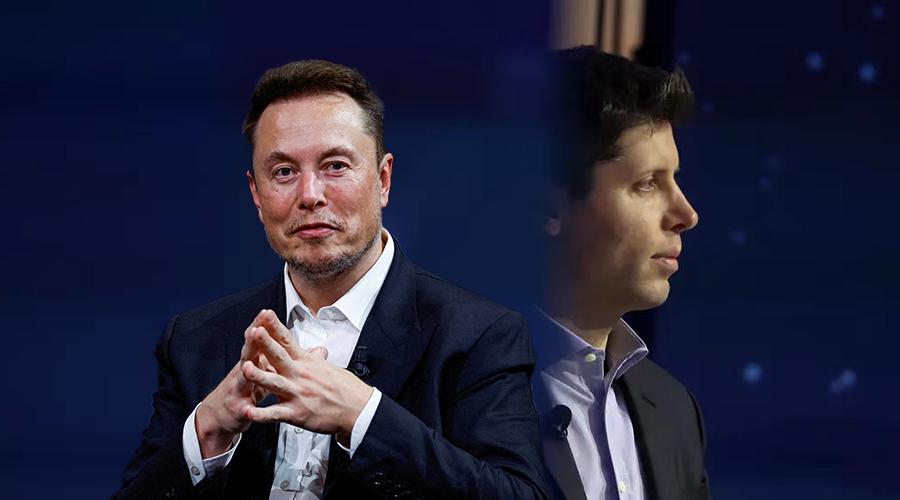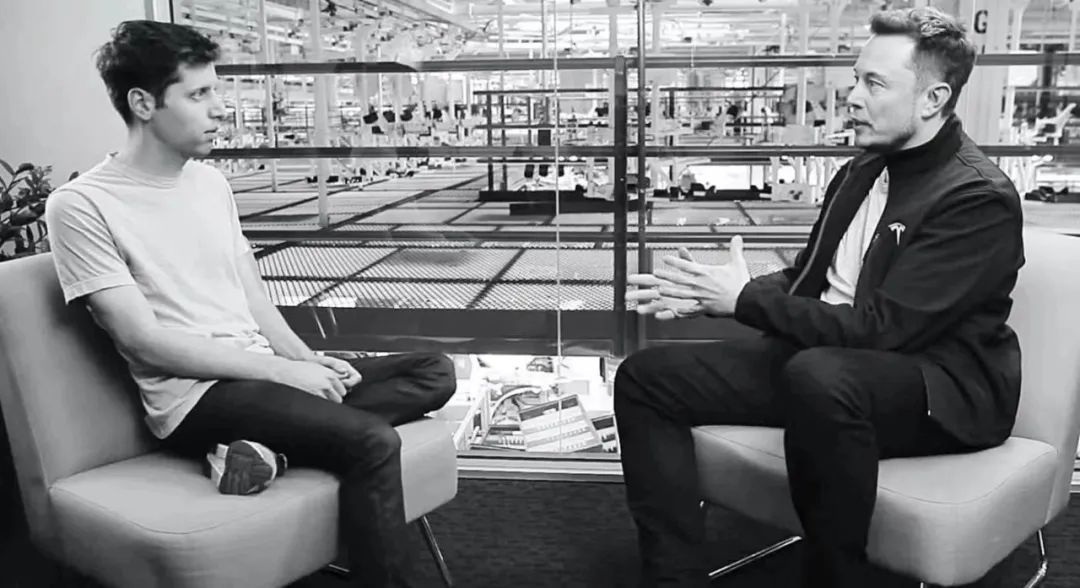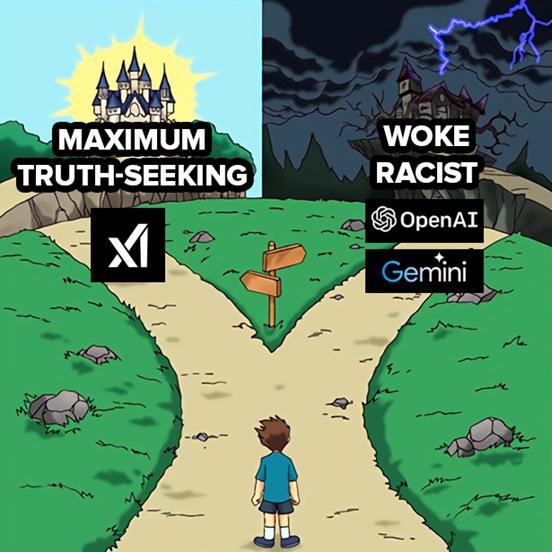Musk is never afraid of competition, and confrontation is his consistent character; what he is afraid of is that there is no way to tear open a hole in a passive situation.
Author: Zhao Weiwei,blue Hole business

“I support OpenAI and @ Sam’s collaborative approach to artificial intelligence, which can bring the best results for humans.” LinkedIn co-founder Reed Hoffman recently said.
This is obviously on the opposite side of Musk. Like Musk, he was once an angel investor in OpenAI and co-launched OpenAI, a non-profit artificial intelligence research laboratory, in order to counter Google’s strong position in this field, but later, Musk and Hoffman both left OpenAI to create their own artificial intelligence company.
Unlike Hoffman’s affectionate love for OpenAI, Musk and OpenAI completely fell apart.
Starting last year, Musk saw OpenAI leaning towards the big company Microsoft. He first publicly called for a moratorium on research on artificial intelligence systems more powerful than GPT-4 for at least six months. Later, Musk himself founded the artificial intelligence company xAI, last year The first artificial intelligence model “Grok” was released in November. Its goal is to “understand the true nature of the universe,” but it is far from OpenAI.
Not long ago, a furious Musk sent OpenAI to court. He would have known that he would face a fierce counterattack from OpenAI.
Musk formally sued OpenAI, arguing that OpenAI should return to open source status and prohibiting the company, CEO Sam Altman and Microsoft from using AI technology to profit from it. Later, in order to refute Musk, OpenIAI listed historical emails from that year in its official blog and slapped Musk with facts: We decided together to create a for-profit entity, but the proposal to merge OpenAI into Tesla was not adopted. Musk left OpenAI.
Simply put, Musk sued and raised the problem, accusing OpenAI of violating its original intention;OpenAI’s counterattack brought the problem to the ground: You were just doing it for competitive interests.
Is Musk anxious?
Looking back at the lawsuits Musk has fought over the past decade or so, it is not difficult to see that resorting to court is just one of his business competition strategies. Musk is never afraid of competition, and confrontation is his consistent character; what he is afraid of is that there is no way to tear open a hole in a passive situation.
01 Old hatred is hard to dispel
Past friendships often appear fragile in the face of current business interests and goals.
On the day Musk formally sued OpenAI, Sam Altman said in an internal memo from OpenAI employees,”Benefiting humans and entrepreneurship are somehow inconsistent. This statement is confusing. I miss the former Musk.”

“Personally, it’s sad.” Musk is 14 years older than Altman, who has always regarded Musk as a personal hero, a man who competes by building better technology, a builder, and someone I want to be on our side.
Altman misses the former Musk, and Musk also misses the former OpenAI.
Musk sued OpenAI. The 46-page indictment filed listed OpenAI’s many “crimes”, such as violating the founding agreement and pursuing commercial interests. Musk believes that OpenAI has become a closed-source subsidiary of Microsoft, the world’s largest technology company. Now the members of the OpenAI board of directors are all selected by Altman and recognized by Microsoft. Therefore, the purpose of OpenAI is no longer to benefit mankind, but to help maximize Microsoft’s benefits.
Judging from the prosecution appeal, Musk wants OpenAI to return to its original intention before commercialization.
The first is to make OpenAI open source and provide the developed artificial intelligence research technology to the public. At the same time, it is also prohibited to use OpenAI and assets to continue to seek economic benefits for the defendant. The second is to rule that GPT-4 and the more advanced GPT-Q are universal artificial intelligence (AGI) and cannot be used by Microsoft. In addition, Musk also claimed for his past losses.
The indictment states that between 2016 and September 2020, Musk donated a total of more than $44 million to OpenAI. But in fact, according to evidence released by OpenAI, Musk raised less than $45 million, while other supporters, including Hoffman, provided more than $90 million.
In OpenAI’s rebuttal article, it further pointed out the key to Musk’s separation from OpenAI: control.
In 2017, OpenAI and Musk reached an agreement to establish a for-profit entity as the next strategic step. “Musk wants to gain a majority stake, gain initial control of the board, and become CEO. In the meantime, he suspended the financial support he had originally planned to provide. Thanks to Reed Hoffman’s generous donation, we filled our funding gap in salary and operations.”
Musk’s suggestion at the time still seems unacceptable today. “In early February 2018, Musk forwarded an email to us suggesting that OpenAI should regard Tesla as its cash cow, commenting that Tesla is the only entity with a hope of competing with Google. Even so, the chance of competing with Google is slim, but at least it’s not zero.”
In fact, according to the description in “The Biography of Musk”, after Musk and OpenAI parted ways, he also poached OpenAI’s deep learning and computer vision expert Andrea Kapas, so that he could lead Tesla’s artificial intelligence project.
“We realized that Tesla would become an artificial intelligence company and would compete with OpenAI for similar talent.” “It made some people on our team angry, but I completely understand what it was about,” Altman said. Later, Altman pulled the game back in 2023: When Karpas was exhausted by Musk, he threw out an olive branch and dug Karpas back.
Therefore, the persistence of old hatred is the key to the dispute between Musk and OpenAI. Past grievances have not been resolved, and the competition for new general artificial intelligence has accelerated, adding a new fire to the two.
02 The new situation is not solved
Musk’s officially announced Grok V1.5 chat robot has not yet been released. As early as February 22, he tweeted that it would be released two weeks later in early March.
Since its release in November last year, Grok chatbots have not attracted much attention in the industry. The artificial intelligence company behind Grok, xAI, was established in July last year and essentially competes with OpenAI. In Musk’s words, competition makes companies honest, and he is in favor of competition.
Grok’s biggest competitive advantage is Musk’s acquisition of Twitter, which allows Grok to use Twitter content for data-level training, including more than 1 trillion tweets posted by everyone over the years, and 500 million new tweets every day. Of course, these are benefits that Musk realized only after acquiring Twitter.
But paradoxically, Musk has repeatedly opposed the commercialization of OpenAI, but his artificial intelligence model Grok has been closely integrated with Twitter’s commercialization from the beginning. Only Twitter Premium+ subscribers can use it, and becoming a Premium+ subscriber costs $16 a month.
Information released by xAI shows that all 12 members of the xAI team are male. They have served in cutting-edge companies such as DeepMind, OpenAI, Google Research, Microsoft Research, Tesla or academic institutions such as famous universities, and have participated in the development of projects such as AlphaStar, AlphaCode, Inception, Minerva, GPT-3.5 and GPT-4.
However, in terms of talent density, xAI is still far behind companies such as OpenAI and Anthropic, the leaders of the big model industry. The current industry’s relatively recognized first echelon strength of the big model is basically concentrated in Anthropic founded by OpenAI, Google and former members of OpenAI. Moreover, Anthropic has received investment from Amazon and Google, and the Internet giants have already taken a good position.
More importantly, the competition for big models in Silicon Valley in the United States has begun to accelerate.
Just in February of this year, Google released a new Gemini 1.5 AI model, and soon open-source the lightweight open source model Gemma. This continuous action is exactly the same as OpenAI’s release of the Wensheng video model Sora. It is both announcing its own capabilities in the field of general-purpose models, which have caused industry shocks.
On the other hand, Musk is no longer the most popular figure in this raging AI wave. “The Legend of Musk” once defined him as this: OpenAI and Google are competing for each other, and a third gladiator is needed on the field, a gladiator who focuses on artificial intelligence security and is committed to protecting mankind.
Musk was once full of confidence. He once stated in “The Legend of Musk”:”Tesla’s accumulated artificial intelligence strength in the real world has been underestimated. Imagine if Tesla and OpenAI had to exchange tasks and they would build autonomous vehicles and we would build a big language model chat robot. Who would win? Of course it’s us.”
Confidence belongs to confidence, and means belong to means.
As confident as Musk, shortly after OpenAI released ChatGPT, he cut off OpenAI’s access to Twitter’s data pipeline and restricted opponents ‘means to guard against the future. Musk has never been soft, so now you can still regard suing OpenAI as one of Musk’s strategies to restrict opponents.

In fact, the Grok chat robot is currently difficult to match Musk’s vision. Musk once said at the launch that xAI’s Grok is very important to humans and will help humans explore the “greatest truth” and the “essence of the universe.” He has not forgotten to step on opponents, saying that OpenAI and Google’s Gemini will only lead humans astray.
In addition, there is news that Musk’s xAI is preparing for a new round of financing. It is currently valued at US$15 billion to US$20 billion and plans to raise US$1 billion through equity financing.
Later, Musk denied the news, but it is undeniable that billions of dollars in consumption are necessary for the large model. He is still releasing information on Twitter for xAI recruitment. How does xAI compete with OpenAI and other peers? Competition remains a problem that troubles him.
03 Strategies for prosecuting and not wanting to lose
There has been constant controversy about Musk, and looking at his entrepreneurial and commercial battles, going to court is often one of his usual strategies to solve problems, and it is also a manifestation of intensified competition in the industry. The most fundamental thing is that this means that Musk is really angry.
For example, as early as Tesla’s founding, he sued famous car designer Henrik Fisker.
Musk approached him at the time and wanted Fisk to design the later ModleS, but in the end the design that Fisk handed over did not match Tesla’s expectations. Later, Musk learned that Fisk helped Tesla make works and established an electric vehicle company on the other hand, and wrote the Tesla product concept that Musk told him into the business plan of his new company.
Musk could not tolerate this betrayal. Although Tesla finally lost the lawsuit and was ordered to pay Fisk $1.14 million in legal fees and fees, Fisk’s electric vehicle company rose rapidly and even stole what might have belonged to Tesla. Low-interest government loans, but the company Fisk started fell in 2013. The company filed for bankruptcy, and Fisk was forced to resign.
In the space competition, Musk’s SpaceX has also sued Bezos for Blue Origin.
At that time, Amazon founders Bezos and Musk were both trying to build reusable rockets. In 2014, Bezos’s Blue Origin applied for a U.S. patent called “Space Launch Vehicle Landing at Sea.” This patent application deals with landing on a sea platform and recovering a certain stage of booster and other parts of it. method.
After Musk saw the patent, his face turned livid and chose to resort to law. Because the method of landing at sea has been discussed for half a century and has appeared in many fictional movies,”But with so much technology available now, it would be crazy to repeat the same tune.” It’s ridiculous to patent something that people have been discussing for half a century.”
The lawsuit intensified the competition between Musk and Bezos on space rockets. As a result, after being sued by SpaceX, Bezos agreed to revoke the patent.
In the drama of Musk’s acquisition of Twitter in 2022, taking the initiative to sue and coerce the other party was also one of Musk’s methods of psychological warfare.
At that time, Musk asked for a reduction in the purchase price when acquiring Twitter, but little progress was made. In Twitter’s plan, the price of US$44 billion could be reduced by 4%, but Musk required a reduction of 10%, otherwise it would not be considered. Amid the psychological tug-of-war between the two sides, Twitter executives and board insisted that no matter how they negotiated, they must be protected from Musk’s future lawsuits.
“We will never let them get legal immunity,” Musk said emotionally at the time.”If we are going to hold them accountable, then we will not let anyone go unless they are dead.”
At one point, Musk wanted to sue Twitter because he believed Twitter’s board and management had lied on robot accounts. But in the end, Musk’s lawyers convinced him that going to court was likely to lose, and the best way was to complete the deal on the original US$44 billion terms. In the end, Musk took over Twitter, achieved his acquisition goal, and Twitter’s former CEO and other people were dismissed.
Looking at Musk’s three lawsuits against Tesla, SpcaeX and Twitter, there were losses, wins and waivers, but the core strategy has not changed. That is, in the face of a competitive landscape that is not conducive to him, he uses legal self-defense to contain opponents, increase his odds of winning, and turn a passive situation into an active attack.
Prosecution is one of the ways to achieve the goal of competition. Even if the lawsuit is lost, this way of openly fighting back and defending interests is in line with his consistent character of fighting to the end. Now that the lawsuit against OpenAI, it even more shows Musk’s stance in the battle against artificial intelligence: he cannot lose.
After OpenAI officially responded to Musk’s indictment, Musk did not respond on Twitter, and the facts and attitudes of all parties were clear at a glance. As for the result, we will have to wait for the final verdict, which is destined to be as long as the evolution of general artificial intelligence. For now, it still depends on how capable xAI’s Grok chat robot is.
Welcome to join the official social community of Shenchao TechFlow
Telegram subscription group: www.gushiio.com/TechFlowDaily
Official Twitter account: www.gushiio.com/TechFlowPost
Twitter英文账号:https://www.gushiio.com/DeFlow_Intern



